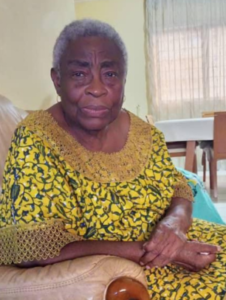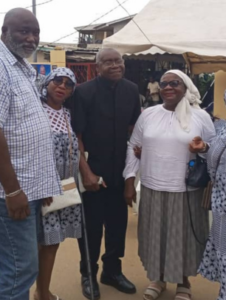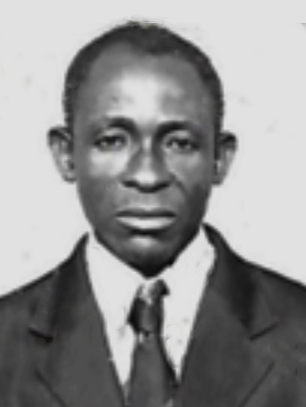41 years old when they signed the petition on 01/07/1957, demanding a fair return on the oil extracted from their subsoil.
In 1916, a child named Ogoula “Wora” Gustave was born in Nyolokwè village (owned by the “Agondjo n'Awenga n'Ayandji” clan).
Wora because he has a twin named Ngwèyèno. Wora is the name given to the first born of the two children. The second is named Yèno if it's a boy and Ngwèyèno if it's a girl.
Son of Eténo Clément (Zi Pandia) of the “Assomba n'Ayamba” clan, descendant of Ogandaga yi Npandia y'Igongo Nkonga yi Ziza y'Ewoulou, and Bita Marguerithe of the “Agondjo n'Awenga” clan.
His mother came from the village of Ossagnia Mongo “Go Mbinda”, whose chief town is Ngola. It's the first village you come to as you travel up the Ogooué from Port-Gentil.
His mother, Bita, had a Senegalese father and an Orungu mother.
She had three children, Ogoula “Wora” Gustave dit Déguisse, Ngwèyèno and Owanga.
At an early age, Déguisse joined his paternal family (his father, Eténo Zi Pandia).
For his education, his father enrolled him at the Catholic Mission school of Sainte-Anne d'Ondimba (Fernan-Vaz). This school had a good reputation.
However, his maternal uncle, called Razinguè, great chief, holder of the ancestral relics and therefore of the clan's power, and master Bwitiste, had only daughters (two, 2).
However, as he had no sons, this posed a real problem of succession in terms of the continuity of the chieftaincy.
Feeling his end was near, Chief Razinguè asked his paternal family to return his nephew Ogoula “Wora” Gustave to his maternal branch.
Power was only passed on to the sister's son, not to the
brother's son. The heir is uncle Razinguè's uterine nephew. Matriarchal supremacy obliges.
Spiritualist and disinterested traditional practitioner
His uncle introduced him to Bwiti and “pharmacopoeia”. Déguisse stayed by his uncle's side for a long time, accompanying him on his various peregrinations, “Ngozés, here and there, all around”. This is how he quickly acquired the gift of healing with plants and magnetism.
He did not have the gift of clairvoyance. So, when he received a patient for treatment, he would first send him to be examined by the “four-eyed clairvoyant”. Then, with the information gathered and the clairvoyant's report on the patient's type of disorder or persecution, Déguisse could pinpoint “what was inside” the patient and prepare a potion, bath or remedy.
No payment was required until the patient was cured. There was no “Orawo” as there is today, where the healer seems to be more concerned with the amount of the Orawo than with the patient's condition. Déguisse was still into symbolism. He considered that, as a healer, he had a “result” obligation before any payment.
However, he would say to the patient, “If you ever feel cured, you know what you'll have to do for me”.
And so, on the death of his uncle Razinguè, Ogoula “Wora” Déguisse ascended to the clan throne. The young chief was listened to, respected and adored by his people. Of course, he inherited his uncle's “Bwiti” called “Mwanga”, which means “Source of all things, all life”. He was one of the few men initiated into the Ndjembè (a secret society reserved for women).
Fair and free man
He did not work for a company ; very loving ; comic with a great sense of humor. Very attached to Bwitiste and Ndjembè culture and tradition. When he received his grandchildren in his village: before depositing their luggage in a house, they first had to “present” it to “Iguénoh du Bwiti”, then enter the “Maison du Bwiti” and go round the “Mbandja” before sitting down in it. His grandson, “Routier”, has not forgotten this ritual. He speaks with passion and regret of that “blessed time” around grandfather Déguisse.
At one point in his life, “Grand-père” had the choice between the Catholic priesthood and the intiatic path of Bwiti, and he opted for Bw
As a landowner in his hinterland, he farmed and fished, which made him a free man who refused to accept subordination in business. He lived between his village and Port-Gentil
He was also Pierre Claver Akendengué's maternal uncle, and they shared the omiènè culture and music. They had a great affection for each other: “Ombalo Déguisse”.
He died in Port-Gentil in 1987, leaving behind the memory of an altruist-humanist, with a sense of sacrifice for others, the defense of the weak (Ntchiré) and the concern to pass on tradition. A true bulwark, a sentinel of the kind that no longer exists today.
He had five children (Essonghé Jeanne, Wora, Ngwèyèno, Eténo, Bita).
His daughter

Jeanne Bushnell (aged 80)
His descendants

Grandson, granddaughter, nephew, nephew's wife.
Source: Daughter Jeanne Bushnell (80); granddaughter Sandra Bushnell; grandson Rénamy dit Routier. Transcription : Joël Paul IGAMBA & Oma. dit Routier. Transcription : Joël Paul IGAMBA & Oma.
